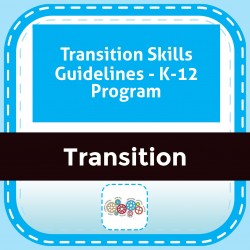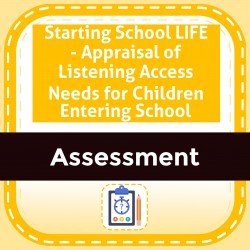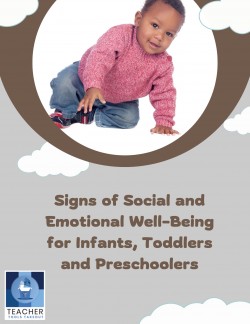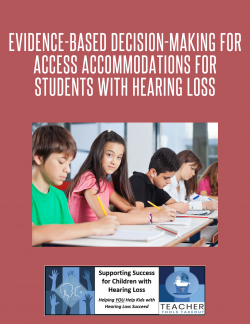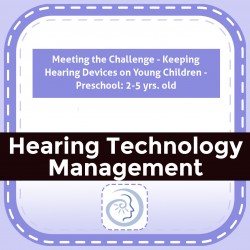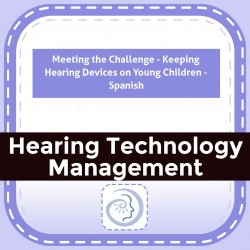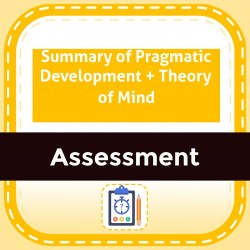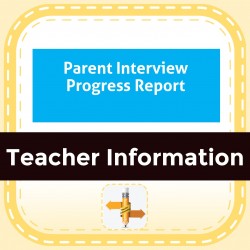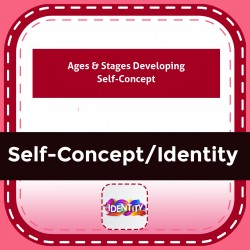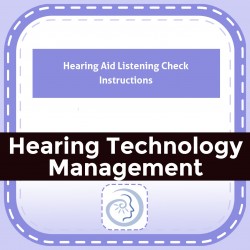Categories
Resource Types
CCSS
Speaking & Listening
Language
Reading
Transition Skills Guidelines - K-2,3-5,6-8,9-12 Program
$ 0
This extensive chart specifies 5 standards for transition skills and topics identified for each skill to meet the standard with goals identified for kindergarten, grades 1-3, 4-5, 6-8, 9, 10, 11, and
...
12. Excellent resource for planning and IEP goal writing. From Laurent Clerc Center, Gallaudet University.
Starting School LIFE - Appraisal of Listening Access Needs for Children Entering School
$ 0
The Starting School LIFE - Appraisal of Listening Access Needs for Children Entering School checklist is designed to be completed by families of children transitioning to school at age 3-5 or moving i
...
n to a new school throughout elementary. Families complete the CHILD checklist (S0XASM0063) and other portions of the Starting School LIFE to provide the school with information about listening challenges to assist in planning for access needs in school. Fillable version available at P01ASM0595.
Signs of Social and Emotional Well-Being for Infants, Toddlers, and Preschoolers
$ 0
This handout lists appropriate behaviors indicating typical development of social-emotional well-being age ranges in months along with recommended actions that a parent or caregiver can take to encour
...
age healthy social-emotional development at each age range. From Center on the Social and Emotional Foundations for Early Learning.
Evidence-Based Decision-Making for Access Accommodations for Students with Hearing Loss
$ 0
This informational handout describes the requirements of Title II of the ADA to ensure communication is as effective for students with hearing loss as it is for peers and how that relates to the need
...
for evidence-based decision-making for access accommodations required for each individual student's school situation. Includes a worksheet for discussion of student situational communication access needs.
Meeting the Challenge - Keeping Hearing Devices on Young Children - Preschool: 2-5 yrs. old
$ 0
Brochure specifying what makes it challenging to keep hearing aids on 2-5 yrs old, why hearing aids are needed, and strategies to help keep them on, including hearing aid retention devices.
Meeting the Challenge - Keeping Hearing Devices on Young Children - Spanish Version
$ 0
Brochure specifying what makes it challenging to keep hearing aids on 0-24 month old babies and 2-5 yrs. old preschoolers, why hearing aids are needed, and strategies to help keep them on, including h
...
earing aid retention devices.
Summary of Pragmatic Development + Theory of Mind
$ 0
This chart provides age ranges for theory of mind development and social interaction behaviors of the typically developing child. Children with hearing loss are often significantly delayed in pragmati
...
c language and/or Theory of Mind and their development should be monitored closely.NOTE: This is for Teacher Tools Members ONLY
Parent Interview Progress Report
$ 0
This checklist is designed to be part of biannual discussions and monitoring between early intervention professionals and family members of infants and toddlers with hearing loss. Family members are a
...
sked to consider the different areas that can affect the rate that communication skills develop and how often their child receives attention to each of these considerations. Areas covered are: Auditory Communication, Visual Communication, and Effective Communication Strategies.
Ages & Stages Developing Self-Concept
$ 0
Self-concept develops from infancy through childhood. This resource describes the stages of self-concept development for ages birth through 2 years, 3-4 years, and 5-6 years. Useful for educational pl
...
anning and understanding behavior, along with the need to strengthen self-concept development.
Hearing Aid Listening Check Instructions
$ 0
Hearing aids need to be monitored every day by a normal hearing listener, especially if the child is very young, is new to wearing hearing aids, or uses them inconsistently. This resource provides a s
...
tep-by-step approach to performing a daily listening check to a child’s hearing aids.

 Your browser is out of date. For best experience switch to latest updated Browser.
Your browser is out of date. For best experience switch to latest updated Browser.
 Get Chrome
Get Chrome Get Edge
Get Edge Get Firefox
Get Firefox
